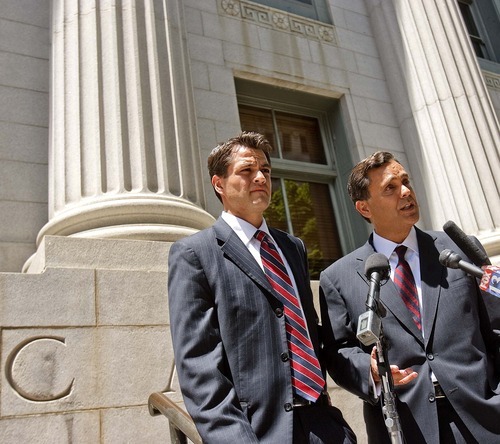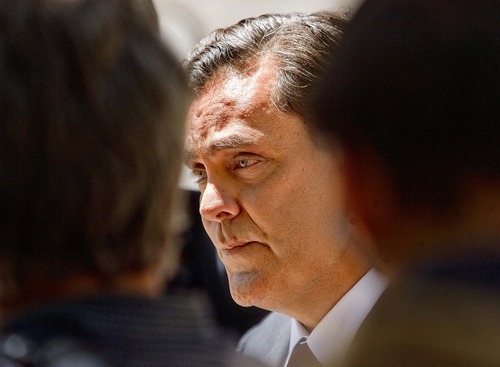This is an archived article that was published on sltrib.com in 2011, and information in the article may be outdated. It is provided only for personal research purposes and may not be reprinted.
Saying the country is at a "critical moment," an attorney for the polygamous family who stars in the reality show "Sister Wives" argued Wednesday that American adults — including Kody Brown and his four wives — have a right to privacy in their intimate relationships.
"We can't embrace privacy as a principle and pick and choose who can enjoy it,"said Jonathan Turley in a press conference outside Salt Lake City's federal courthouse. "Now, this family doesn't look like a lot of families in Utah, but it's not your family. It's their family."
He was not accompanied by the Browns. Turley said they were in Nevada, where they moved after Lehi police began an investigation following the start of their TLC show.
Turley on Wednesday filed a lawsuit seeking to strike down the Utah's bigamy law, which makes it a felony to marry or cohabitate with more than one person.
The complaint is primarily based on the 2003 U.S. Supreme Court decision that struck down the Texas law banning sodomy, which was celebrated by gay rights advocates.
Utah Attorney General Mark Shurtleff, however, said the bigamy law is different because it involves entire families, not just consenting adults.
"Custody, child support, alimony — all these things are going to different if ultimately the courts rule there is a constitutional interference," he said Tuesday. "I think [the Brown case] going to be a bit of a stretch but we're going to aggressively defend it."
Turley countered by saying the Browns are asking only for polygamy to be decriminalized, not for multiple marriages to be legally recognized. If the case is successful, he said the courts should treat multiple spouses the same way they treat monogamous couples who live together without being married.
Another potential hurdle with the suit is proving the Browns have standing to challenge the law. They haven't been charged with any crimes, and no longer live in Utah. Turley's lawsuit attempts to bypass that issue by seeking an injunction against the bigamy statute to prevent the Browns from being charged with a crime. According to the suit, the family "expects" to move back to Utah as well as return to visit relatives. The Utah County attorney has said the investigation into the Browns remains open.
"We believe that it's ridiculous to require that polygamous families be brought to the criminal dock before they can get a review of the statute that defines them as a criminal," Turley said.
But Salt Lake City civil rights attorney Brian Barnard said they may find legal standing to be a problem.
"The fact that a law is on the books and maybe there might be a prosecution doesn't necessarily give them standing to bring a legal challenge," said Barnard, who represented a woman who unsuccessfully sued after attempting to become a second wife in 2004. "Federal judges are loathe to weigh in on something hypothetical."
Even though the suit will be primarily based on privacy, polygamy is also a deeply held religious belief for the Browns and tens of thousands of other fundamentalist Mormon families, Turley said. The U.S. Supreme Court ruled out religious freedom as justification for lawful polygamy more than a hundred years ago.
When asked whether polygamy necessarily leads to crimes like underage marriage, as critics say, Turley said that polygamous families should be judged individually. Despite child abuse and other crimes that occur in traditional families, "we don't say we should ban monogamous marriages," he said.
Tess McCormack, who was visiting Salt Lake City from Rockland County, N.Y., on Wednesday and decided to attend Turley's press conference, pointed out the irony of family in a reality show arguing for privacy.
"If they wanted [privacy] they would not have done the show," McCormack said.
Turley said the Browns want the privacy afforded by the Constitution.
"I don't think anyone can look at this complaint and say its a PR stunt," he said, adding that he is working pro bono and TLC did not know the family planned to sue.
Turley said the case may end up before the U.S. Supreme Court.
"We are prepared to go all the way," he said.
Twitter: @lwhitehurst —
What's next?
P Although no hearings were scheduled in the case, the complaint may go to a courtroom relatively quickly, since it doesn't require testimony. U.S. District Judge Clark Waddoups is presiding.







